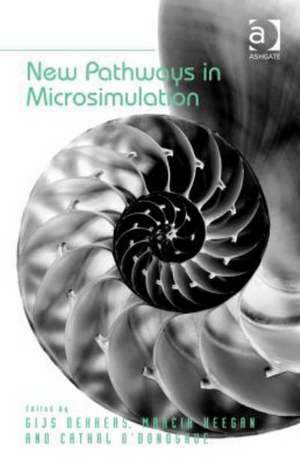New Pathways in Microsimulation
Autor Gijs Dekkers, Marcia Keeganen Limba Engleză Hardback – 12 feb 2014
| Toate formatele și edițiile | Preț | Express |
|---|---|---|
| Paperback (1) | 452.47 lei 43-57 zile | |
| Taylor & Francis – 9 sep 2016 | 452.47 lei 43-57 zile | |
| Hardback (1) | 1059.48 lei 43-57 zile | |
| Taylor & Francis – 12 feb 2014 | 1059.48 lei 43-57 zile |
Preț: 1059.48 lei
Preț vechi: 1292.05 lei
-18% Nou
Puncte Express: 1589
Preț estimativ în valută:
202.91€ • 209.06$ • 169.98£
202.91€ • 209.06$ • 169.98£
Carte tipărită la comandă
Livrare economică 24 februarie-10 martie
Preluare comenzi: 021 569.72.76
Specificații
ISBN-13: 9781409469315
ISBN-10: 140946931X
Pagini: 344
Dimensiuni: 156 x 234 x 21 mm
Greutate: 0.82 kg
Ediția:New.
Editura: Taylor & Francis
Colecția Routledge
Locul publicării:Oxford, United Kingdom
ISBN-10: 140946931X
Pagini: 344
Dimensiuni: 156 x 234 x 21 mm
Greutate: 0.82 kg
Ediția:New.
Editura: Taylor & Francis
Colecția Routledge
Locul publicării:Oxford, United Kingdom
Notă biografică
Gijs Dekkers is Senior Researcher at the Directorate General of the Federal Planning Bureau, Belgium, Research Associate at the Centre for Sociological Research CESO, Katholieke Universiteit Leuven, Belgium, and Affiliated Senior Researcher at CEPS/INSTEAD in Luxembourg. He is also chief editor of the International Journal of Microsimulation. Dr Marcia Keegan is a Research Fellow and member of the Income & Wealth Team at NATSEM, University of Canberra, Australia. She is Vice President of the International Microsimulation Association and President of Young Economists Australia. Cathal O'Donoghue is the Head of the Rural Economy Research Centre of Teagasc, the Irish Agriculture and Food Development Authority. He is convenor of the UK Department of Work and Pensions' Expert Group on Economic Demography and President of the International Microsimulation Association.
Recenzii
’New Pathways in Microsimulation is an extremely useful reference for those involved in the design and the evaluation of tax-benefit systems. Beyond methodological advances, it contains valuable examples from different policy domains, for example from the very timely field of pension reform in light of demographic and budgetary pressures. The authors demonstrate the substantial added value of microsimulations over purely aggregate or representative agent models.' Alain Jousten, University of Liège, Belgium and Maastricht University, Holland ’This volume illustrates the powerful approach of microsimulation in policy evaluation and design. There is a broad review of current applications including the effectiveness of tax-benefit policy, the analysis of poverty, health status, population ageing and the spatial effects of VAT-increases on household expenditures. Those interested in pension issues will for instance benefit from an analysis of the impact of the financial crisis on old-age poverty in Sweden using a model, which allows an interaction between the pension system, the labour market and an endogenous tax policy. Also recommended is a chapter on a stylized model of the pension system in Belgium, which brings out a number of basic properties of the system. However, a comparison demonstrates the advantages of a fully developed microsimulation model. Model builders will for instance enjoy contemplating how far the ideas of estimating block recursive models, and validating models by backwards simulation of a historical period will take us. This book is highly recommended to policy analysts, model builders and readers with a general interest in economics and social science.’ Anders Klevmarken, Professor Emeritus, Uppsala University, Sweden.
Cuprins
List of Figures, List of Tables, Editors’ Biographies, List of Contributors, 1. Introduction, 2. Estimating the Small Area Effects of Austerity Measures in the UK, 3. Microsimulation Estimates of the Inequality Impact of the Economic Crisis in Ireland, 4. Simulating the Need for Health- and Elderly Care in Sweden – A Model Description of SESIM-LEV, 5. An Australian Disease and Long-term Care Microsimulation Model, 6. Projection of the Supply of Nurses in France: A Microsimulation Model, 7. Gender Aspects of the Norwegian Pension System, 8. The Redistributive Features of the Italian Pension System: The Importance of Being Neutral, 9. Simulating Policy Alternatives for Public Pensions in Japan, 10. On the Construction of Early Warning Indicators of Old-Age Poverty: The Index-Building versus the Microsimulation Approach, 11. How Sensitive is Old-Age Poverty to Financial Crisis? A Microsimulation Experiment for Sweden, 12. Going Regional: The Effectiveness of Different Tax-benefit Policies in Combating Child Poverty in Spain, 13. Combining EUROMOD and LIAM Tools for the Development of Dynamic Cross-sectional Microsimulation Models: A Sneak Preview, 14. An Overview of Binary Alignment Methods in Microsimulation, 15. Simulating the Expenditures of Scottish Households: A Two-step Microsimulation Approach to the Cairngorms National Park, 16. Using Excel as a Front End to a Microsimulation Model on Energy and Water Concession Pricing, 17. Modelling Sequences of Events with Chain Graph Models, 18. Education in the Norwegian Microsimulation Model MOSART, 19. What are the Driving Forces behind Trends in Inequality among Pensioners? Validating MIDAS Belgium Using a Stylized Model, 20. An Investigation of the Sensitivity of a Dynamic Microsimulation Model of Urban Neighbourhood Dynamics, Index
Descriere
Edited by leading experts in the field, this book illustrates recent advances, methodologies and uses of socioeconomic microsimulation in social sciences around the world. It does so by analysing new grounds covered in microsimulation and exploring new applications in traditional fields. As such, the chapters - grouped into five sections: new methods and methodology; pensions; financial crisis and austerity measures; health; and poverty - present recent, innovative and challenging work in various fields that is not just relevant for those in that field, but that might also inspire scholars from the other disciplines to broaden their minds to new and exciting uses of this established methodology.












